Richard Duarte's Blog
April 24, 2020
Coronavirus Aftermath – A Health & Economic Crisis, Ten Things to Know
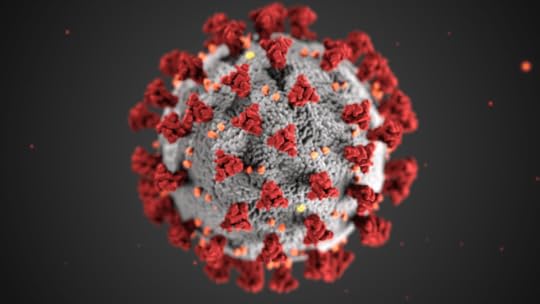 Coronavirus Aftermath – A Health & Economic Crisis,
Coronavirus Aftermath – A Health & Economic Crisis,
Ten Things You Need to Know
[image error]As the daily death toll slowly declines, and a number of states have started to relax restrictions, many people are asking the obvious questions – what will our world look like in the aftermath of the COVID-19 pandemic? What might we expect after the lock down, mass closures, social distancing, and the economic, political and societal turmoil that has defined the preceding months? And, most importantly, how can we prepare for what’s coming next? While there have been many disasters in our lifetime, nothing like this has ever happened before. Understandably, no one really seems to know where all of this will end up. But, within all the uncertainty, there are certain patterns staring to develop. Some of these patterns are very disturbing. Even more disturbing, is the information we continue to get from the mainstream media, the government and other organizations which continues to be very confusing, and is often contradictory. This only adds to the frustration, fear and anxiety of a population in the grips of the worse disaster in recent memory. At this moment, many of us feel that we are truly on our own. This is precisely the time when we need to start looking ahead, and thinking 2-3 moves in advance. With that in mind, I wanted to share my thoughts on the present situation, and what the near-term might bring. Below are some of the issues and concerns that I’ve identified. These are also the areas where I anticipate we may see the most significant changes, some of which will represent a dramatic shift in what we have come to know as normal. While this list is not all inclusive, it does represent some of the issues that I believe will most likely affect many of us in the months, and possibly years to come.
The Economic Recovery Will Be Very Slow And Very Painful. When we start to reopen the economy, it will be in stages, and nothing will snap back quickly. This means that a good number of businesses, even after they open again, will probably continue losing money for some time to come. It’s difficult to estimate, but some experts are predicting that many businesses (small & large) may not survive. Contrary to popular belief, the economy in the U.S., and in many other counties, was already showing signs of weakness. Even before the pandemic, and the resulting shutdowns, many businesses were already in trouble, and highly leveraged with huge levels of debt. The stock market was also at historical highs, and provided many with a false sense of confidence. But, stock market performance in recent years was more a result of massive stock buy-backs, along with the actions of the Federal Reserve, rather than a reflection of the health of the economy. On Main Street, real people have been struggling for years, and many remained afloat by incurring huge debt burdens. As it stands now, no amount of government stimulus, interest rate cuts, or quantitative easing will make up for the monumental losses brought about by closing the world’s biggest economy for an extended period of time; or for the many millions of unemployed, and for the underlying troubles that were already brewing right below the surface. Contrary to what you may hear on the news, for many businesses the recovery will be very long, very difficult and very, very painful. Those who manage to avoid bankruptcy will be the lucky ones, countless others will fold, never to be heard from again. Many economist are now warning that the worst is yet to come.
Fewer Small Businesses. Small businesses are defined as firms employing fewer than 500 employees. Yet, according to the SBA, small businesses employ about 47.5% of the country’s total employee workforce. For decades, small businesses have been under siege, and under tremendous pressure from all angles, including competition from bigger, more powerful companies, and a rapidly changing business environment. Small “mom and pop” establishments have all but disappeared in many industries – for example hardware stores, pharmacies, and “brick & mortar” retail. Those that remain, now face an even bigger challenge – the COVID-19 pandemic and the resulting economic crisis. These businesses were already under severe financial strain, and struggling to compete in an environment dominated by some very large players. As we emerge from lock down, many small businesses will never reopen, and those that do, will face an uncertain future. This is a huge concern, considering that almost half the nation’s workforce is employed by small businesses.
Fewer Jobs, Smaller Salaries, Reduced Benefits. Due in part to the coronavirus, and the massive shutdowns, many employers have already drastically reduced their workforce. Many more are looking for creative ways to cut costs, redefine their business models, and to figure out inventive ways to operate with fewer employees and reduced overhead. A good number of jobs will never come back. Even after those businesses reopen, and customers start returning, employers will be very slow to bring back workers; and even if they do start to rehire, they will do so in reduced numbers, with smaller paychecks, and far fewer benefits. The economy has taken a massive hit, and it’s anticipated that consumer demand will be depressed for months, maybe even years. By all indications, going forward, most people will have less disposable income, and will be far more frugal. Expect to see businesses consolidate, reduce costs, automate and try to increase profitability and shareholder value, no matter how it affects workers, the economy or Main Street America. It will be survival of the fittest. For those lucky enough to still have a job, declining or stagnant wages will be the norm. Also expect employers to reduce, or eliminate many employee perks and benefits. Already some employers have announced that they are suspending their 401(k) match. (MarketWatch) It’s curious how most of these employers never increased 401(k) contributions, salaries, or employee benefits when profits and share prices were at record highs. It seems the only thing these corporations are willing to share are their losses. Lastly, many companies (large & small) may seek bankruptcy protection and attempt to reorganize. If this occurs, vendors, suppliers and other unsecured creditors should expect to be paid pennies on the dollar, if at all. Employee wages and other benefits, may also be sacrificed in the interest of “saving the company.” It’s important to remember that none of these things will happen in a vacuum, and will bring serious repercussions (a chain reaction) throughout the entire economy. If this crisis has shown us anything, it’s that living above our means comes at a very steep price. Too many of us have been living paycheck to paycheck, assuming that nothing bad would ever happen. We spent money we didn’t have, and we borrowed heavily to finance a lifestyle that we couldn’t otherwise afford. It’s now become obvious, that corporations of all sizes were doing the exact same thing. Going forward people will likely spend less, and adjust their lifestyle to reflect the economic reality that the only financial security any of us have, is that which we create for ourselves.
Massive Inflation, Huge Deficits: After a brief period of deflation, we should expect to start seeing the inflationary effects of all the currency (stimulus) that the Federal Reserve has pumped, and will continue to inject, into the economy. This means that everything will become more expensive. Think hyper-inflation on steroids. Meanwhile, the gap between the “haves” and everyone else will continue to grow wider with each day that passes. Most Americans have failed to notice any of this, even though for years it’s all been happening in plain sight. The national deficit is now so out-of-control, that most of us can no longer wrap our minds around the dollar amounts, and all the zeros. The deficit, however, will continue to climb to even higher amounts in the years to come. The American tax payer will be paying for the national debt for generations to come. Meanwhile, corporations that have spent over 7 Trillion dollars on stock buybacks and dividends, were among the first in line for federal bailout and stimulus money. (MarketWatch)
The Calm is Only a Respite: To be clear the Coronavirus is not going away, it’s here to stay. We will eventually develop a vaccine, and treatment. But COVID-19 will become one among many other viruses that live alongside us. In the meantime, however, we are told that warmer weather and higher humidity will bring a dip in the number of cases, and a much needed period of calm. The CDC, however, is already warning that we should expect a second wave of coronavirus that will be even worse, explaining that winter could bring simultaneous flu, and COVID-19 outbreaks, overwhelming hospitals.(MarketWatch) For most of us, this respite is a golden opportunity to get better prepared for not only the anticipated second wave, but for any other natural or man-made disasters that may be layered on top of the return of COVID-19. Hopefully the last few months have served as a wake-up call, and a reminder that when a disaster strikes, no one is coming to our rescue. You can be prepared, or you can be a victim. The choice is yours. Personally, I will use whatever time we have, to fortify and improve my preparations, applying the lessons learned during the last few months. Hopefully, the vast majority of Americans will do the same.
[image error]Social Distancing Becomes the New Normal: Just because we start to reopen the country, does not mean that people will easily forget the trauma of the last few months. Behavioral experts are predicting that many people will be very slow to go back to their old ways, if at all. For many of us that means fewer handshakes and hugs, no large public gatherings, and a more home-bound existence. Theaters, concert halls, sports arenas, and all other forums where large crowds gather for entertainment or leisure, will struggle for years to come trying to come up with ways to protect the public, while still staying in business. Restaurants and bars will need to figure out ways to keep their doors open with far fewer customers, lower levels of revenue, and increased expenses. Schools will need to reduce the number of students in classrooms, and employers will need to find the room to redesign open work spaces to accommodate safe distances between workers. And public transportation will be strained since it will no longer be able to pack trains, buses and other modes of transportation with riders. How all this will work out is anyone’s guess.
Permanent Life/Work Changes: Think of massive increases in work-from-home, telemedicine, on-line education, and even recreational activities like exercising. There are a multitude of companies uniquely positioned to make what just a few months ago seemed impractical, and unworkable into an immediate reality. Looking back on it now, the technology was there, but there was still considerable resistance to such enormous changes. Now that we have crossed those thresholds, there’s no turning back. In most situations the economic benefits will far outweigh any residual resistance that may still linger. Going forward, we should all expect to see a lot less face-to-face human interactions, and an increased on-line presence permeating just about every aspect of our lives. It remains to be seen if these trends will benefit, or hurt the average American.
A Cashless Society. For years, governments around the world have been laying the groundwork to eliminate paper currency, and to replace it with something digital. But, recent events will no doubt accelerate the transition to a cashless economic state. Imagine all exchanges being conducted via digital credits and debits. Some would argue that we’re almost there. Many people already collect their salary by direct deposit, then they pay their bills with online banking tools. Daily expenses, even very small expenses, are paid with credit cards, debit cards, Apple Pay, PayPal, and dozens of other e-merchants that have recently emerged. Going forward, you should also expect to see massive efforts designed to “protect” the public from currency that they will claim is dirty, and a medium for spreading germs, bacteria and viruses. This will present a tremendous opportunity in the interest of “public safety” to shift to a digital currency. There are some very large companies that have been lobbying very aggressively for cash-less payment systems, and for far fewer regulations and legal restrictions. The coronavirus pandemic may finally give them all the cover they have been looking for to turn their plans into reality. While these large firms will profit greatly and further solidify their control and influence, and governments will gain an even tighter grip on its citizen’s lives, we will all lose freedom, flexibility, and the ability to conduct our legal, financial transactions with any level of privacy. Sweden is already considered the most cashless society in the world. China, however, is the first major economy to explore launching its own digital currency, and has been testing a mobile app. (scmp.com)
Increased Crime and Social Unrest: Up until now, having the majority of the population on lockdown has kept the streets relatively quiet. While there has been an increase in domestic violence crimes amid the lockdown, police have reported sharp decreases in the number of other serious crimes in America’s biggest cities. While the United States has not seen any civil unrest, looting or rioting yet, this can all change if economic conditions don’t improve quickly. People may not be receiving a paycheck, but they still need to feed themselves, and keep a roof over their head. As of the April 23, 2020, 26.5 million workers had filed jobless claims. (26.5 million in five weeks.) The real unemployment rate in America topped 20% and that number is expected to increase in the coming months. (fortune.com) The United States has not seen such a steep increase in unemployment since the Great Depression. What will happen when people start running out of money and are unable to feed themselves. Even under the best of circumstances, many police departments are spread thin. During the pandemic, many officers have fallen ill, or have been quarantined after coming in contact with an infected person. This has further reduced the effectiveness of many police departments, as they struggle to maintain a community presence, and respond to 911 calls.
“What will likely prompt looting, rioting, civil unrest will be if public services are overloaded,” Andrew Bringuel II, a retired supervisory special agent at the FBI’s Behavioral Analysis Unit and executive director of the Behavioral Science Unit, wrote in an email. “If people lose their public trust in the confidence that the police can maintain social order, they will begin to defend themselves against those who don’t recognize the rule of law. Thomas Hobb[e]s described this as a breakdown of the social contract, and it’s really an imbalance in social equilibrium.” (Washington Examiner)
This is all very concerning, since any chance at an expedited recovery depends on being able to reopen businesses, public transportation, roads, schools and other vital infrastructure. If civil unrest starts to occur, and becomes severe enough, we may be facing additional shutdowns along with massive interruptions on an unprecedented scale.
[image error]
Food Shortages and Supply Chain Interruptions: During the early stages of the pandemic, we started seeing cracks in the supply chain. The first visible signs were shortages of food, and other vital supplies. Initially, hoarding was blamed for the empty store shelves, but that was only part of the story. Even after purchase limits were placed on certain items, many products were still not available in many locations. Fast forward 30 days, and much sought after products are still noticeably absent from store shelves. The reality is that many businesses are dependent on global sourcing, and even when the sourcing is done domestically, the supply chains are often long, complicated, and susceptible to serious disruptions by a multitude of factors. Add “just in time inventory” (a strategy to increase efficiency and decrease costs by receiving goods only when needed.) to the equation and it becomes clear that there will likely be no quick, easy answer to this problem. Some economist are saying that Americans could start seeing meat shortages as early as May. What is clear is that prices will increase, and consumers will have far fewer choices when buying meat, and other food options. This could become a serious problem for American consumers who are already highly stressed out. Many people are suffering severe economic hardship, and coping with uncertainty of what will happen next. Add to that the perception of food shortages, and it can easily lead to panic buying, hoarding, in anticipation of even more serious shortages, and possibly civil unrest and/or looting by desperate groups of people who have run out of money, can’t feed themselves or their family, and consider that they have nothing left to lose. While the temporary shortages are real, the perception of something worse to come, can be even more damaging. https://www.politico.com/news/2020/04/23/meat-shortage-coronavirus-shutdowns-205689
Conclusion:
These are incredibly difficult times for many of us. But, being prepared and having a plan can help us stay focused, and bring some level of certainty and security to an otherwise challenging situation. Here are some basic tips and ideas for you to consider:
Preparedness is all about replacing confusion and fear, with clarity and purpose. You can be prepared or you can be a victim, resolve to never be a victim.
No one really knows what will happen next. Use the coming pause to fine-tune your preparations, and to make any necessary changes/adjustments to your plans and preparations.
Focus your attention on the survival essentials, the things that really matter to stay alive – food and water, first-aid and medical, security and self-defense, knowing when to stay put and when to leave, and sanitation and hygiene. Think of all the things that you wish you had during the last month or so, and try to anticipate what you may need going forward. Make a list, and get it done.
Stock up on all necessary supplies as soon as you are able. While I am not encouraging anyone to “hoard” anything, I am encouraging people to get the vital supplies they need, while they’re available. There’s a big difference between hoarding, and preparing. Be prepared, don’t waste the opportunity, and don’t allow others to shame you for doing exactly what you should be doing – getting prepared. While the misguided waste their time criticizing those who take decisive action, you’ll be taking vital steps to safeguard your family.
If you can, also try to improve your survival knowledge and skills. Read books, watch videos, get first aid training, and don’t neglect security and self-defense skills. Knowledge is always better than “stuff” but it’s best to have both.
Safeguard your health, eat well, get sufficient sleep and exercise, and make every effort to avoid things that can damage your health and wellbeing.
Have a survival plan. Discuss and plan with all members of your family or group, and make sure to test your plan far in advance of the day you need to use it.
Save as much money as you can. Now is not a good time to spend money on anything other than the essentials.
If possible, pay off debt, and eliminate any unnecessary expenses from your monthly overhead. Going forward, the economic waters will be very rough, this is an excellent time to get you economic house in order, and to cut any discretionary spending.
Remember, the pandemic is now front and center, but so many other things can happen, even while we’re struggling with COVID-19 and the resulting crisis. Keep both eyes on the bigger picture.
I can go on and on, but I have to cut it off somewhere. Hopefully, the preceding information helps you and your family in these difficult times.
Stay Safe and Be Prepared.
Copyright © 2020 All Rights Reserved. Quick Start Survival & Urban Survival Tech, Inc.
COVID-19 Image Courtesy of The Centers for Decease Control and Prevention (CDC) Public Health Image Library (PHIL)
The post Coronavirus Aftermath – A Health & Economic Crisis, Ten Things to Know appeared first on Quick Start Survival.
December 18, 2019
Ten Smart Things to do Before Year-End
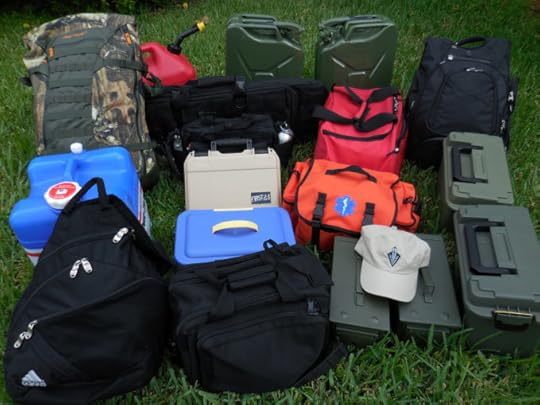
Ten Smart Things to do Before Year-End
As incredible as it may seem, 2019 is almost gone. The end of any year is always hectic, but it’s also a great time to reflect on lessons learned, fine-tune our goals, and most importantly to set yourself up for success in the coming year. Even if you don’t have a lot of time, there are a number of very basic steps you can take right now. Most of the items on our year-end list can be accomplished quickly, but the benefits will help you get 2020 off to a very good start.
Here’s a list of 10 tips, ideas and planning suggestions to consider before 2019 comes to a close.
Back to Basics. With all the fancy gear, and all the high-tech gadgets available it’s easy to get caught up in all the “stuff” at the expense of the basic items that we all need to survive after a disaster – food, water, first aid/medical, self-defense and security, sanitation and hygiene, and knowing when to get out and when to stay put. This is a very good time to revisit, and secure, the basics – what I call the Core Survival Elements. Focus on the CSEs and don’t worry about the gadgets; you’ll also save some money.
Food stores. Now is an excellent time to review and rotate all your food stores. Even long-term food stores need attention. Check out all the dates, the condition of the containers, and make sure that you are using your supplies in the proper order – First-In, First-Out (FIFO). Inspect all cans and packages. Look for seals that may have been compromised. Discard any food in containers showing signs of rust, corrosion, damage, or any cans that are leaking, bulging or swollen. Also discard any food that is discolored, mushy, moldy, or has a foul odor. Replace discarded items, and remind yourself to rotate supplies often throughout the year. See Crisis Cuisine-Long-Term Food Storage.
Water & water disinfection supplies.Water is essential to maintain life. Most people will not survive for more than three days without access to fresh, potable water. You should store ample water supplies, and also have redundant ways to disinfect water. See Water Storage Essentials.
Update and rotate your Bug-Out-Bag (BOB) inventory. Bugging out will usually be the last resort, but you still need to be ready. Focus on the survival essentials, and keep your bag light, well organized and current. For a list of supplies see my article “Bug-Out Bag 101”
Update and rotate your Get-Home-Bag (GHB) inventory. If a crisis occurs and you’re away from home, how will you get back to your family? A Get Home Bag (GHB) contains the tools to help you get back home from wherever you happen to be when a crisis strikes. If you don’t already have a GHB in your office, place of business, school or vehicle – it’s time to get one. Check out our list of supplies, ideas and suggestions to set-up your GHB.
Review, update and rotate your Emergency Vehicle Kit (EVK inventory.) Every driver should have a well-stocked EVK in their vehicle(s) at all times. A roadside emergency can happen to anyone, usually without any warning. Imagine that you’re driving and you get a flat tire, or your car battery gives out. You may find yourself on the side of the road in an isolated area, or in an empty parking lot, late at night and far from help. Being prepared can help you get back on the road faster, reduce your stress and help keep you safe. Check out our Emergency Vehicle Kit
Legal and financial documents and information.This is an excellent time to review, identify, organize and securely store all your legal and financial documents and information. If you’re like most people, the majority of your legal and financial documents are probably sitting in a drawer somewhere in your house. As important as these documents are, few of us ever bother to take the proper steps to secure and protect them. After a crisis, however, we will need access to this important information in the rebuilding and reconstruction phase of the disaster. If you haven’t addressed this vulnerability, do yourself a favor and get it done now. We can help you get started – Legal & Financial Preps.
Review, test, evaluate and update all emergency plans. Plans are a necessary part of any viable survival strategy; even though most situations never develop as you may have anticipated. The very act of analyzing a potential disaster situation, however, will usually broaden your options. This is not to say that you should be planning for specific events, but you should be planning on how you will afford yourself access to the CSEs, how you will bug-out, shelter-in-place, or get back home, after a disaster. If you have not planned for any of these possibilities, now is a very good time to get started.
Read at least one preparedness, or survival book. The mind is the most valuable survival resource, and acquiring knowledge and skills should be one of your top priorities for 2020. But, why not get started right now. There are more books and resources available today than ever before. Pick a topic, an author or, or an area that interest you and get a fresh prospective, learn new skills, and share that new-found knowledge with your family or group members.
Get at least one other person interested in preparedness. This is not something you hear about often, but this last suggestion may one day save you and yours a lot of heartache. The idea is simple, the more of us that are prepared the better for everyone else. If after a disaster friends, neighbors and relatives start showing up at your house, what would you do? Few of us can make adequate preparations for large groups of people. Take the opportunity to share the word with your friends, neighbors and loved ones. What they do is up to them, but we can certainly try to open their eyes and, and at least encourage them to make a few basic preparations. Having the folks around you prepared, could represent one less potential difficulty for you to deal with after a disaster or public emergency. Check out Pivot Points by Paul T. Martin.
Remember the idea is not to follow a list, but rather to focus your efforts on the things that really matter in your situation. At the end of the day, the only plans and preparations that actually matter are the one you make in advance; once the crisis is upon you, it’s too late.
Stay Safe and be prepared!
Richard Duarte
The post Ten Smart Things to do Before Year-End appeared first on Quick Start Survival.
March 13, 2019
Hurricane Irma – Lessons Learned (SWAT Magazine)
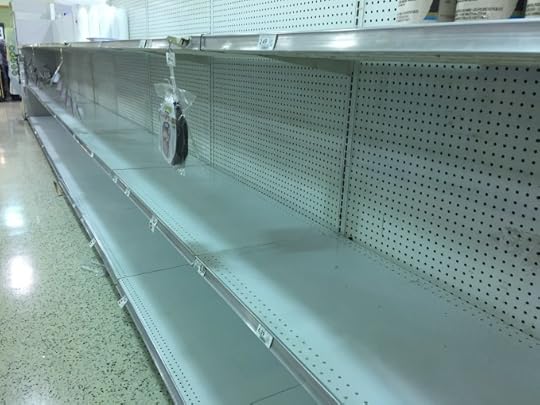
The Following is an excerpt from the full article, available below or at www.swatmag.com/
“On Sunday, September 10, 2017 Hurricane Irma, a Category 5 storm, approached the state of Florida. In anticipation of the life-threatening winds, rain and flooding, a lot of nervous residents evacuated north creating massive traffic jams on Interstates 75, 95 and the Florida Turnpike. Many others decided to shelter in place and ride out the storm; I was among those who chose to hunker down.
As it turns out, Irma was a killer storm, it showed no mercy and took no prisoners. (The unofficial death toll in Florida exceeded 70.) For a while it seemed as if Irma could be the storm that would finally wipe South Florida off the map. Irma’s path veered to the west, however, and heavily populated Miami-Dade, Broward and Palm Beach counties avoided a direct strike; the Florida Keys were not as lucky. South Florida got lots of rain, considerable wind damage, and a power outage that, for many, would last for well over a week – but all in all, it could have been much worse.
In the aftermath, there were many examples of the prepared, the unprepared and the under-prepared. There were also many lessons to be learned from the experience. After all, no matter how good your preparations and plans are, there will always be ample room for improvement if you’re paying attention; this is especially true during an actual disaster.
Many of these lessons are not unique to tropical storms, and can be applied to many other disaster situations. If there was anything positive to come from Hurricane Irma, it was the very loud wake-up call that many people got.
I found the examples below to be particularly interesting. You may consider them as insights to add to your survival tool box, or even a confirmation of things you may already know, but they are all powerful reminders that we must always be prepared, and that we can never let our guard down.
In this article we take a look at some of the lessons learned before, during, and after Hurricane Irma.”
SWAT Magazine (March 2018)
In this article we take a look at the 10 essential repair items no BOB should ever be without. These are the crucial supplies you’ll need to make repairs quickly and efficiently. Check it out!
Read Article HERE! Hurricane Irma – Lessons Learned – SWAT Magazine (March 2018)
“Reprinted with permission from Group One Enterprises, Inc. Copyright © 2018 All Rights Reserved. www.swatmag.com/
To keep up on the latest in weapons, gear, tactics, training and survival, make sure to pick up a subscription to SWAT Magazine. (Available in Print or Digital)
The post Hurricane Irma – Lessons Learned (SWAT Magazine) appeared first on Quick Start Survival.
October 30, 2017
Titan Ready USA HERC XXL Candle-Lit Oven Review – Recoil/OffGrid
 Titan Ready USA HERC XXL Candle-Lit Oven Review
Titan Ready USA HERC XXL Candle-Lit Oven Review[image error]
Recoil/OffGrid (Issue 22)
Life after a man-made or natural disaster is always difficult. Even under the best of circumstances, we might still need to deal with loss of power, and adapting to the new “normal.” One of the biggest challenges people face is feeding themselves. In the aftermath of a disaster, however, options for cooking, or even heating-up food, may be severely limited by the circumstances. In a crisis situation, if you want to eat hot meals, you’ll need innovative options.
I recently did a review of the Titan Ready HERC XXL Oven for Recoil/OffGrid Magazine. The Titan Ready HERC XXL Oven is a safe and reliable off grid cooking option for rural or urban dwellers. Cook, bake and dehydrate by harnessing the thermal energy from affordable tea light candles. If you’re looking for a safe and reliable way to cook, heat-up and dehydrate food, you’ll want to check this out.
Read the full article here for FREE. (https://www.offgridweb.com/gear/titan-ready-usa-herc-xxl-candle-lit-oven-review/)
The post Titan Ready USA HERC XXL Candle-Lit Oven Review – Recoil/OffGrid appeared first on Quick Start Survival.
October 5, 2017
The Prep Few Ever Consider…
 Being Prepared
Being PreparedBeing “prepared” can mean many things to many different people. Traditionally, a lot of us consider ourselves relatively well prepared if we have a viable survival plan, and if we address what I call the Core Survival Elements (CSE) – food, water, 1st aid & medication, security & self-defense, hygiene & sanitation and knowing when to stay put, and when to get out fast. These are the absolute basics, but also a great start.
In the real-world however, we are often faced with many threats that can’t be addressed with traditional survival knowledge, skills and supplies. These risks are very real and can financially decimate an individual, and their family, just as much as a natural or man-made disaster. To really be prepared, we must expand our narrow definition of “survival” to include as many of these other exposures as possible. One really big area, that few people even consider until it’s too late, is financial security. Here’s a recent example of just how vulnerable we really are.
The Breach
Sometime between mid-May and July 2017, hackers successfully attacked and infiltrated Equifax. This breach exposed the personal, and highly sensitive information of 145.5 million U.S. consumers. (Not a typo) Or roughly one half of the U.S. population. Equifax officials did not report the breach to the public until September 7, 2017. (Three senior Equifax executives sold company shares worth $1.8 million just days after Equifax discovered the breach, but before it was disclosed to the public.)
Equifax CEO, Richard F. Smith, who would later testify before a House subcommittee, claiming that the breach was …”a mistake by a single employee.” Ironically, in March 2017, the Department of Homeland Security had sent Equifax an alert about a critical software vulnerability that Equifax was using in an online portal. Equifax failed to act on this warning.
Mr. Smith did repeatedly apologize to members of the House and the American public, and although he was not at all clear on just how consumers would be compensated, Equifax did offer one-year of “free” credit monitoring to all consumers who were harmed. (After the first year these affected consumers would have to pay for the service.)
Credit bureaus, like Equifax for example, offer all sorts of services to consumers – identity theft protection, fraud prevention, credit monitoring, etc. All of these services come at a cost to the consumer and have become increasingly popular as the risk of fraud and identity theft continues to raise. These services also represent an expanding and very lucrative revenue stream for these companies. It seems that every data breach increases the potential client base for these services. Just one more thing to consider.
Bottom Line For Consumers
At the end of the day, Equifax will probably get a slap on the wrist, they will maybe pay a relatively small fine, and will eventually settle any pending litigation. The members of Congress will report to the American public, that justice has been done, and life will go on. Until the next time.
The focus of this article, however, is centered around what the average consumer can do to protect themselves (as much as is possible and practical.)
Criminals steal sensitive, personal consumer information so that they can use it to commit financial fraud – getting a loan, opening a bank account or filing a fraudulent tax return to claim your refund. With your personal information, criminals could do practically anything a consumer with good credit could do. When consumers become victims of ID fraud, they may not find out about it right away. When they do discover the fraud, it may take years and a great deal of time and effort to correct the problem(s), fix their credit, and get a possible refund of the monies lost. All in all, ID theft can become a lingering nightmare that in many instances will never go away completely.
No Easy Fix
For the average consumer there are no easy fixes. There are, however, some possible tools to help get some level of protection. This list is by no means complete, but it’s meant to get you started on the right path. Here are some ideas to consider.
Freeze your Credit. A credit freeze, or security freeze restricts access to your credit report, making it more difficult for criminals to use your personal information to apply for credit. This is by no means a guarantee, but it’s an effective tool. There are costs, but it’s the best money you will ever spend if it brings you peace of mind. To learn more visit the Federal Trade Commission Web Site https://www.consumer.ftc.gov/articles/0497-credit-freeze-faqs
Monitor all your accounts, bank statements, credit statements and other financial account every month. Here are some other suggestions from the Federal Trade Commission Web Site – https://www.consumer.ftc.gov/topics/privacy-identity-online-security
Limit the number of accounts you maintain. The fewer accounts you have, the less there is to monitor.
Guard your personal information. There are lots of situations where you will be asked to provide all of your personal information, including your social security number. Next time just say no, and see what happens. In my experience, they usually won’t press the issue. (Personally, I can’t remember my social security number, and I certainly don’t carry my card in my wallet. You get the idea.) Also shred all papers/documents containing personal information before discarding.
Wrap-up
As with most other things in life, the majority of the population will usually not even consider a potential threat until something really bad happens and they are forced to confront it. A large part of the preparedness mindset is to anticipate potential threats, and to take appropriate steps and precautions to guard against becoming a victim. Legal and financial preparations require time, effort and in some instances money. But, prevention or at least mitigation, will always be better than dealing with the aftermath of a disaster, yes even a financial disaster.
Identity theft and fraud will never go away completely, but when the very companies that we entrust to maintain and safeguard our most sensitive and personal information start becoming part of the problem, it’s time for consumers to start seriously considering what they can do to protect themselves.
DISCLAIMER
No Attorney-client relationship is created by the use of the information in this publication. The general material provided is for informational purposes only, and is not, nor is it intended to provide legal and/or financial advice. The reader should consult with an appropriate professional in their particular jurisdiction regarding their individual situation. Any use of the general information contained in this article shall be solely at the reader’s risk.
Sources:
https://www.nytimes.com/2017/10/03/business/equifax-congress-data-breach.html
https://www.consumer.ftc.gov/blog/2017/09/equifax-data-breach-what-do
https://www.consumer.ftc.gov/articles/0497-credit-freeze-faqs
The post The Prep Few Ever Consider… appeared first on Quick Start Survival.
September 7, 2017
Basic Survival Sanitation – Hygiene When The Water Stops Flowing
 [image error]
[image error]
Basic Survival Sanitation – SWAT Magazine (August 2017)
When I wrote this article for S.W.A.T. Magazine-August 2017, I never imagined that we would be needing these very preparations so soon. As I write this post we are only a few days away from the projected landfall of Hurricane Irma, a category 5 killer storm. They are saying that Irma can quite possibly be the most powerful, and dangerous, storm to ever form in the Atlantic. As we make all our final preparations, and secure our homes the best we can, (How do you prepare for the destructive power of 185 mph winds?) we are reminded just how important it is to be prepared and to have a plan(s).
[image error]
Many supermarket shelves have been stripped clean.
Here in my hometown of Miami, there are lots of panicked and stressed out people as the realization sinks in that this storm is serious, and the resources have become very scarce right before the storm. (Many supermarket shelves are empty, and gasoline has become very difficult to find.) But, we still have to do our very best to be ready not only for the actual storm, but for the aftermath.
In this article we take a look at the basics of survival sanitation with specific emphasis on tips, ideas and suggestions to help you make your preparations for what can often be the most challenging period of the disaster – the aftermath. Check it out!
Read Article HERE! Basic Survival Sanitation – SWAT Magazine (August 2017)
“Reprinted with permission from Group One Enterprises, Inc. Copyright © 2017 All Rights Reserved. www.swatmag.com/
To keep up on the latest in weapons, gear, tactics, training and survival, make sure to pick up a subscription to SWAT Magazine. (Available in Print or Digital)
The post Basic Survival Sanitation – Hygiene When The Water Stops Flowing appeared first on Quick Start Survival.
August 31, 2017
Crisis Cuisine – Long-Term Food Storage
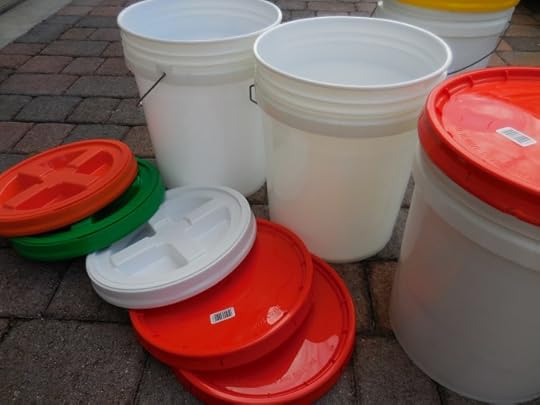 Shelf-Stable Foods for the Long-Haul
Shelf-Stable Foods for the Long-Haul
[image error]
S.W.A.T. Magazine (June 2017)
“Disasters are always short-term, until they’re not. Because of this inconvenient reality, long-term food security should always be a major priority in every survival plan.” SWAT Magazine
In this article we take a look at the basics of long-term food security with specific emphasis on tips, ideas and suggestions to help you start making your preparations, while also saving some serious money. Check it out!
S.W.A.T. Magazine – Crisis Cuisine – Long-Term Food Storage (June 2017) READ ARTICLE HERE.
“Reprinted with permission from Group One Enterprises, Inc. Copyright © 2017 All Rights Reserved. www.swatvault.com
To keep up on the latest in weapons, gear, tactics, training and survival, make sure to pick up a subscription to SWAT Magazine. (Now Available in Print or Digital)
The post Crisis Cuisine – Long-Term Food Storage appeared first on Quick Start Survival.
August 21, 2017
Managing Your Survival Team Dynamics – Modern Combat & Survival Podcast
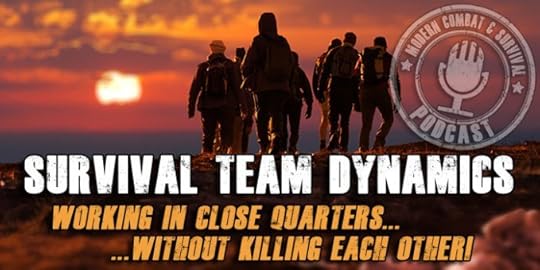 I recently did a podcast with Jeff Anderson, from Modern Combat and Survival Magazine. The focus of this episode is Survival Team Dynamics, and how to work through the challenges with the other members of your group. Check out the description below, from the Modern Combat & Survival web site:
I recently did a podcast with Jeff Anderson, from Modern Combat and Survival Magazine. The focus of this episode is Survival Team Dynamics, and how to work through the challenges with the other members of your group. Check out the description below, from the Modern Combat & Survival web site:The reality of a survival situation, especially a long-term survival situation, is that you may find yourself living under tremendous stress with scarce resources.
This is why we’ve talked extensively in the past about why you should consider building a survival team to band together with like-minded preppers and pool your skills and resources for better odds of survival.
But the “human” side of survival can be just as challenging as the environment you find yourself in… if not more!
In this week’s episode, urban survival expert and author, Richard Duarte, shares his best strategies for leading a survival team through the hardest times… without killing each other in the process!”
-Modern Combat & Survival Magazine
https://moderncombatandsurvival.com/survival/mcs-153-managing-survival-team-dynamics/
The post Managing Your Survival Team Dynamics – Modern Combat & Survival Podcast appeared first on Quick Start Survival.
June 13, 2017
Close Quarter Etiquette – The Unspoken Rules of Conduct in SHTF and Post-Crisis Situations (Recoil-OffGrid Issue 20)

You’ve got food, water, 1st aid, security, self-defense and a killer BOB. But is that enough? It’s a great start, but if you want to give yourself every possible advantage you can’t neglect the human element. In this article I tackle those tricky issues that usually arise when groups of people are forced to coexist within a confined area for an extended period of time. I call it CQE or Close Quarter Etiquette.
“CQE requires establishing and respecting boundaries, observing proper sanitation/hygiene and safety procedures, employing stress-management skills, and showing consideration and respect for others.”
At first glance it may seem like a whole lot of “touchy/feely” stuff, but it’s all about practical survival and the skills you’ll need to navigate some very difficult situations.
Read the full article in Issue 20, on-sale now. Don’t miss out! And check out the Recoil-Offgrid website https://www.offgridweb.com/survival/close-quarter-etiquette/
Copyright 2017 by TEN: The Enthusiast Network Magazines, LLC. All Rights Reserved. (Reprinted with Permission.)
The post Close Quarter Etiquette – The Unspoken Rules of Conduct in SHTF and Post-Crisis Situations (Recoil-OffGrid Issue 20) appeared first on Quick Start Survival.
May 12, 2017
EMP Attack – Prepping For A Modern-Day Dark Age (Recoil-OffGrid Issue 19)
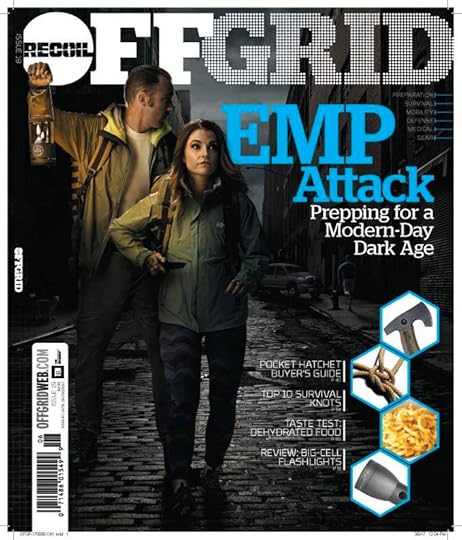 If an EMP attack rendered all technology worthless, would you be prepared? In Issue 19, of Recoil-Offgrid, I join subject matter experts Tim MacWelch and Kevin Reeves in exploring what a possible EMP attack might look like, and some possible strategies for survival. Thanks to the guys at Recoil-OffGrid, we have been given permission to post an excerpt from the full article to give our readers a sneak peek.
If an EMP attack rendered all technology worthless, would you be prepared? In Issue 19, of Recoil-Offgrid, I join subject matter experts Tim MacWelch and Kevin Reeves in exploring what a possible EMP attack might look like, and some possible strategies for survival. Thanks to the guys at Recoil-OffGrid, we have been given permission to post an excerpt from the full article to give our readers a sneak peek.Read the full “What-If” scenario in Issue 19, on-sale now. Don’t miss out! (Click Here To Read Excerpt.)
Copyright 2017 by TEN: The Enthusiast Network Magazines, LLC. All Rights Reserved. (Reprinted with Permission.)
The post EMP Attack – Prepping For A Modern-Day Dark Age (Recoil-OffGrid Issue 19) appeared first on Quick Start Survival.



